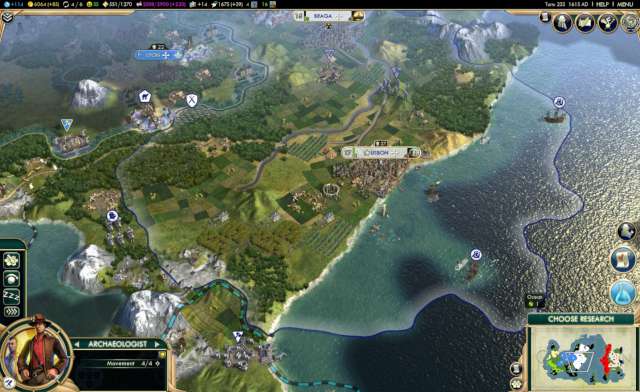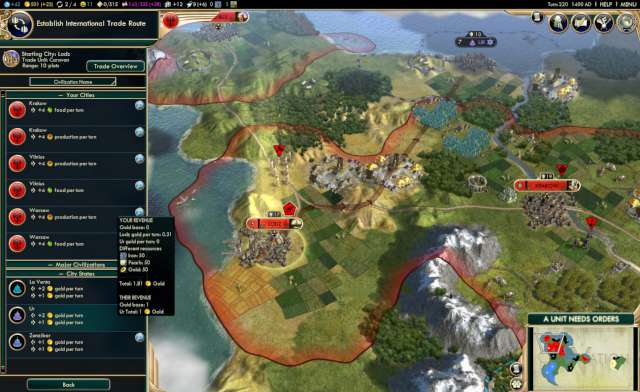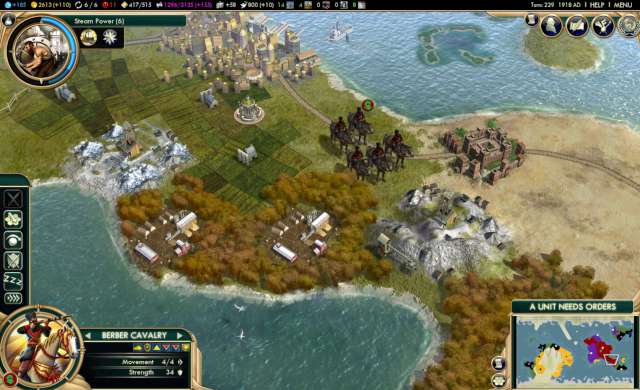“I ate civilization. It poisoned me; I was defiled. And then," he added in a lower tone, "I ate my own wickedness.” – Aldous Huxley, Brave New World
Civilization V, like its predecessors, can be a test of self-control: You must prevent yourself from breaking your strategic temperament and subsequently blasting away every opponent with sheer military force. This doesn't mean that getting a victory through culture or diplomacy is any less a testament to your skill, but it's usually not that engaging. Thoughtfully filling out five out of ten social trees, birthing Great People, and negotiating affairs and resources with your surrounding city-states aren't so thrilling compared to the joyous explosions of unapologetic warfare. Hey, Ghandi had it coming!
Brave New World, Civilization V's second downloadable content, aims to amend this issue along with the problem of stagnant tension. After gleeful exploration and active city-building of the world in the first half of a match, the action usually becomes routine, by and large moving turn by turn in predictable fashion. Though Brave New World doesn't literally introduce players to a "brave new world," it refines and revamps the slower portions of Civilization V in respectful, meaningful ways.
One of the more immediately noticeable changes is tourism, which offers a more active component to attaining a culture victory, now won by being a dominate influence on every other civilization. For an analogy, tourism is offense and culture is defense. If you can pressure your opponents by compelling their citizenry through your great works, they will slowly but surely turn in your favor; that is, if their own cultural development isn't keeping up with yours.
In addition to producing Wonders as well as creating Great Writers, Great Artists, and Great Musicians whose great works can be placed in museums, opera houses, and libraries, tourism can be earned through archaeologists. Once Archaeology is obtained on the technology tree, they can be produced in cities (cannot be purchased) and explore Antiquity Sites scattered about the world, with some artifacts based on battles that your civilization fought during an earlier era just several hours ago. Every artifact found in a dig can permanently raise tourism by two points, so there comes a point in the mid-game when there's a mad dash toward finding every last one before another civilization becomes too culturally strong.
Complementing archaelogy is another new mid-game feature called ideologies, which appear once you reach the Modern Era or construct three factories. Embedded in the Social Policy tree, they offer one of three options—Freedom, Order, or Autocracy—each tailored for different victory conditions and come with various tenets that enact far-reaching effects throughout your civilization. Early adopters gain several tenets for free, as if you need any more incentive to get through the technology tree as quickly as possible. Ideological tenets at the third level are so powerful, however, that there's little point choosing any of the generally weaker Social Policies that come before it.

Cleverly integrating with tourism, ideologies deeply impact cultural influence by providing bonuses between civilization with similar edicts and, best of all, creating friction between civilizations with differing ones. Civilizations with the most tourism can cause low Public Opinion in its rivals, especially if there are trade routes between them. Any civilization with poor Public Opinion can find their cities rebelling, creating destruction from within (and a sinister laugh if you're the one causing it).
As another boost to the mid-game, an introductory but no less significant version of the United Nations called the World Congress is called into action once one civilization has discovered all the others and has researched the printing press. That civilization becomes the all-important host nation, earning a bonus delegate and the ability to propose a resolution at every session. Spies, introduced in Gods & Kings, can also be turned into diplomats who can tell you how one civilization plans on voting and can purchase (aka, legally bribe) that civilization's vote.
Better yet, the World Congress considerably improves the relevance of city-states, as every allied city-state grants its civilization an extra delegate. Diplomacy is far more potent now, and the power to block other civilizations with far too powerful technology, resources, military, or culture can be done much earlier. With this expansion, the costly expense of becoming friends with your civilization's neighbors pays off in spades.

In fact, this expense is not even that costly anymore, particularly with the revamp of Trade Routes which provide handfuls of gold and a few resources every turn. You might even want to try playing as Venice, a new "city-state" civilization that can't settle or annex cities but compensates greatly by having double the trade routes. That said, with the nine new civilizations bringing the total count to 43, it would behoove the developers to edit some of them out for the sake of brevity.
The only trouble with Brave New World is its opening price point of $29.99, which is on one hand worth the cost but on the other is a bit high considering that this expansion is more about refinement than anything else. Some of the AI behavior can still be strange as well. That said, those of you still loading up Civ IV because you find Civ V "broken" will find Brave New World to be the fix you've been waiting three years for. Time to advance to the next era!
-
All-around refinement
-
Amps up the mid-game for better tension
-
Tourism and archaeology
-
Ideologies and cultural influence
-
World Congress significantly improves relevance of city-states
-
Revamped trade routes
-
Somewhat high price point (for now)
-
Ideologies, once available, make Social Policies practically obsolete











